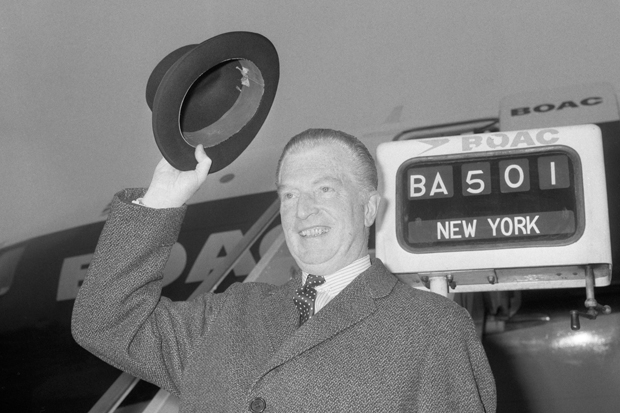They don’t make Englishmen like the aptly named John Freeman any more. When he died last Christmas just shy of his centenary, the obituaries — once they had expressed astonishment that this titan from the age of Attlee and empire had still been around —paid tribute to a polymath whose achievements could fill nine more ordinary lives.
Freeman was a pioneer of television, virtually inventing the TV celebrity interview. He was a leading politician — the last surviving member of the 1945 Labour government; a diplomat — at one time our man in Washington and High Commissioner in India; a much decorated war hero; and — not least — a renowned swordsman between the sheets, boasting four wives and innumerable girlfriends.
For his tenacious biographer Hugh Purcell, Freeman was also a quarry to be ruthlessly hunted down. Purcell had long been fascinated that a figure who was once a household name could vanish into obscurity in his own lifetime, leaving nothing behind but his wives and children — and fading film of his famous TV confrontations with the likes of C.G. Jung, Edith Sitwell, Evelyn Waugh and Augustus John.
Purcell managed to scrape an acquaintence with his ageing subject, but found him less than co-operative. By then living in a home for retired officers in Barnes, Freeman expressed scepticism that anyone would be interested in his life, and refused to help Purcell’s biographical project — but nor, crucially, did he hinder it.
Ignoring the discouragement, Purcell pressed on, and the resulting book — for all its lacunae caused by Freeman’s determination to dodge the limelight in which he had bathed so many others — is a revealing portrait of one of the oddest and most elusive fish to have swum through the reaches of the British ruling class at its apogee.
The son of a ‘boring’ businessman and his ‘silly’ wife (typically, the acerbic judgments are Freeman’s rather than Purcell’s), Freeman was educated at Westminster, where he underwent an instant conversion to socialism after witnessing the Jarrow hunger march, and Brasenose, Oxford, where he wrote (pseudonymously) for Cherwell, and begun his spectacular career as a ladies’ man.
Nicknamed ‘Red’ for his hair colour rather than his politics, Freeman marked time as an ad man before being swept up by the war. Enlisting as a ranker, he swiftly secured a commission and served through the North African and Italian campaigns and the final liberation of Europe, demonstrating both bravery and organisational ability, and winning praise from Montgomery himself. (The admiration was not mutual.)
With the seemingly effortless ease that marked his entire life, Freeman had, via his first wife, secured the Labour nomination as candidate for Watford while still fighting the war, and was elected in the 1945 landslide. Introduced to Churchill after an impressive maiden speech, he reduced the great man to tears and the observation that ‘all the best young men are on the other side now’.
Contemporaries expected Freeman to go far in politics, but, having played a part in negotiating Burma’s independence and risen to be minister of supply, boredom set in. He had always preferred the louche company of cronies like Tom Driberg to more serious political players, and with the return of the Tories to power in 1951, Freeman followed political friends like Woodrow Wyatt and Christopher Chataway into the shiny new world of TV.
His seminal Face to Face interviews gave viewers unprecedented insights into the great and good of the age, with their sometimes cruelly direct questions exposing the vulnerabilities of the likes of Tony Hancock. Occasionally though, Freeman was hoist by his own petard. Asked whether he personally would be prepared to carry out the death penalty he supported, a cigar-smoking Evelyn Waugh tartly replied that he would be most surprised if the government could find no one better qualified to be a hangman than an elderly novelist.
Psychologically, the fascinating thing about Freeman’s interviews was that the camera, focussing unsparingly on the interviewee’s face, never showed Freeman’s own. It proved a metaphor for his entire life, even when the return of Labour in 1964 opened yet another career for him: as a high-flying diplomat, first in Delhi, then as ambassador to the Washington of Watergate, before he gently subsided into American academia as a professor in his final career before retirement.
Only once did Freeman uncharacteristically let his rigidly maintained guard slip, when he himself submitted to radio interview with Anthony Clare in In the Psychiatrist’s Chair. He gave little away, but it was enough for Clare privately to pronounce him ‘a social psychopath’. Purcell is more merciful to the man he has pursued for so long. Acknowledging Freeman’s ‘stiff upper lip and all the repression that implies’, he nonetheless concludes that his reluctant subject was a truly free man who enjoyed spectacular success without really trying.






Comments